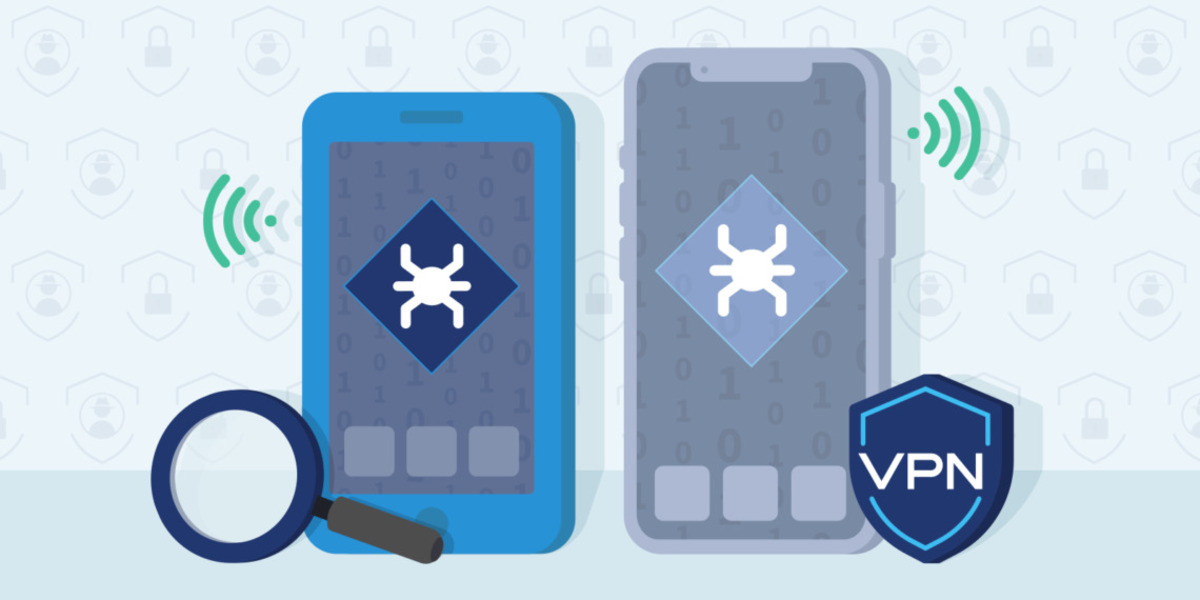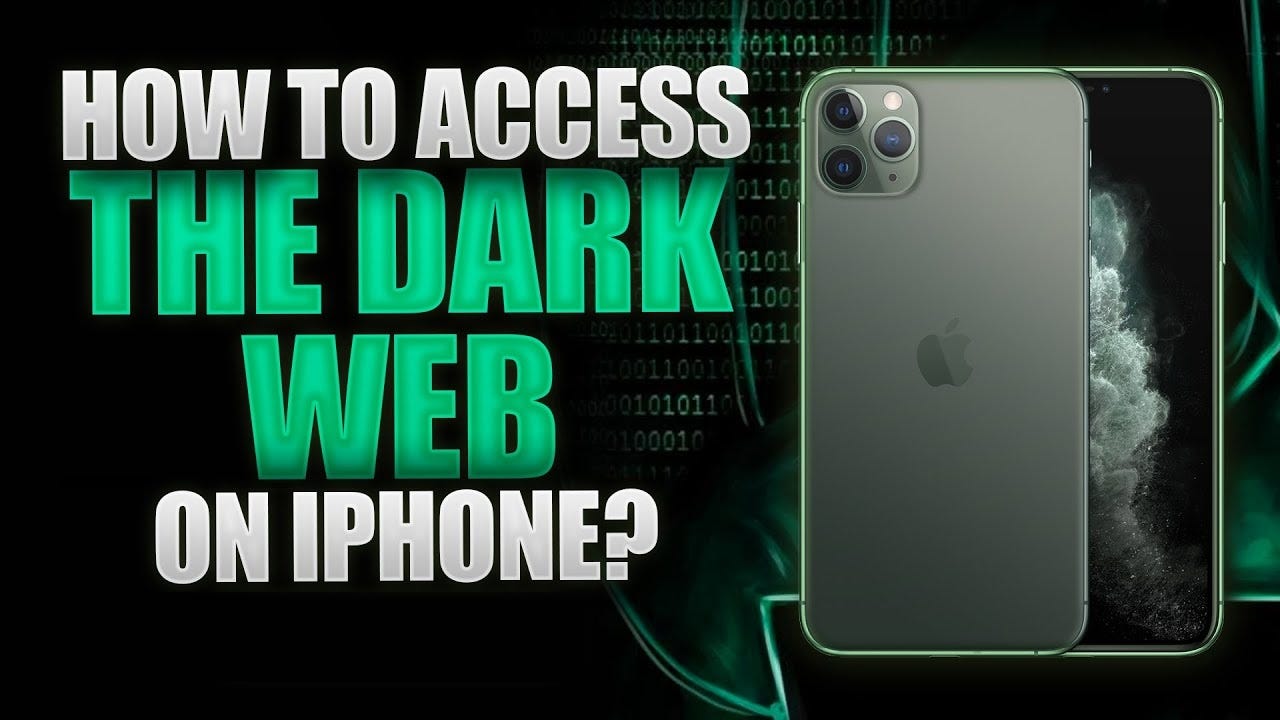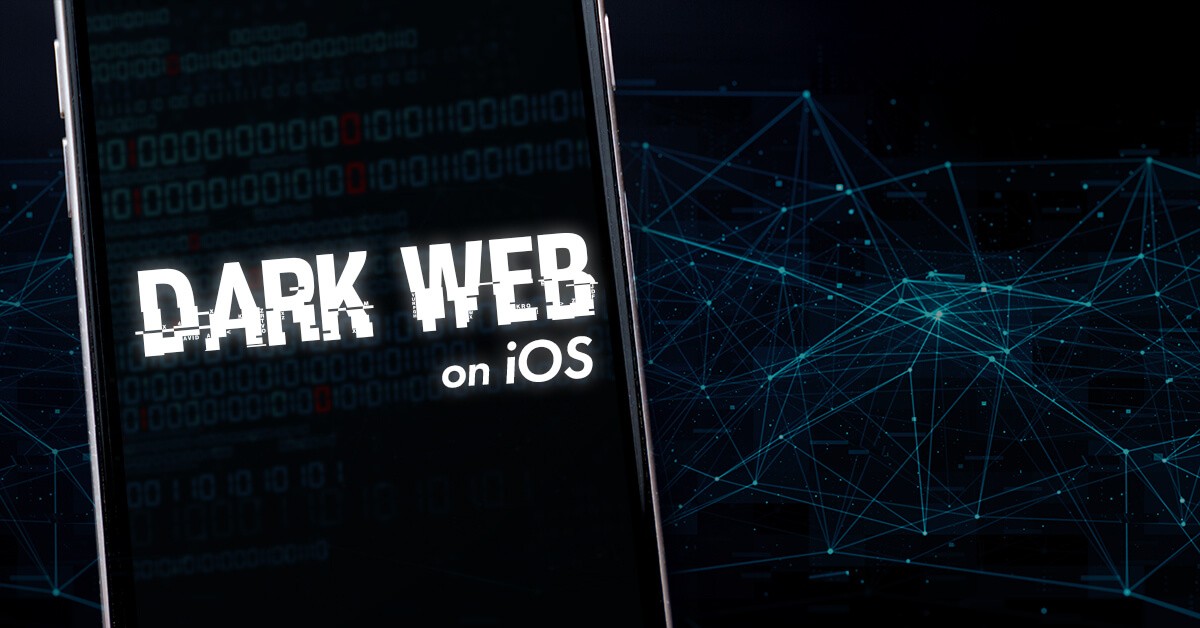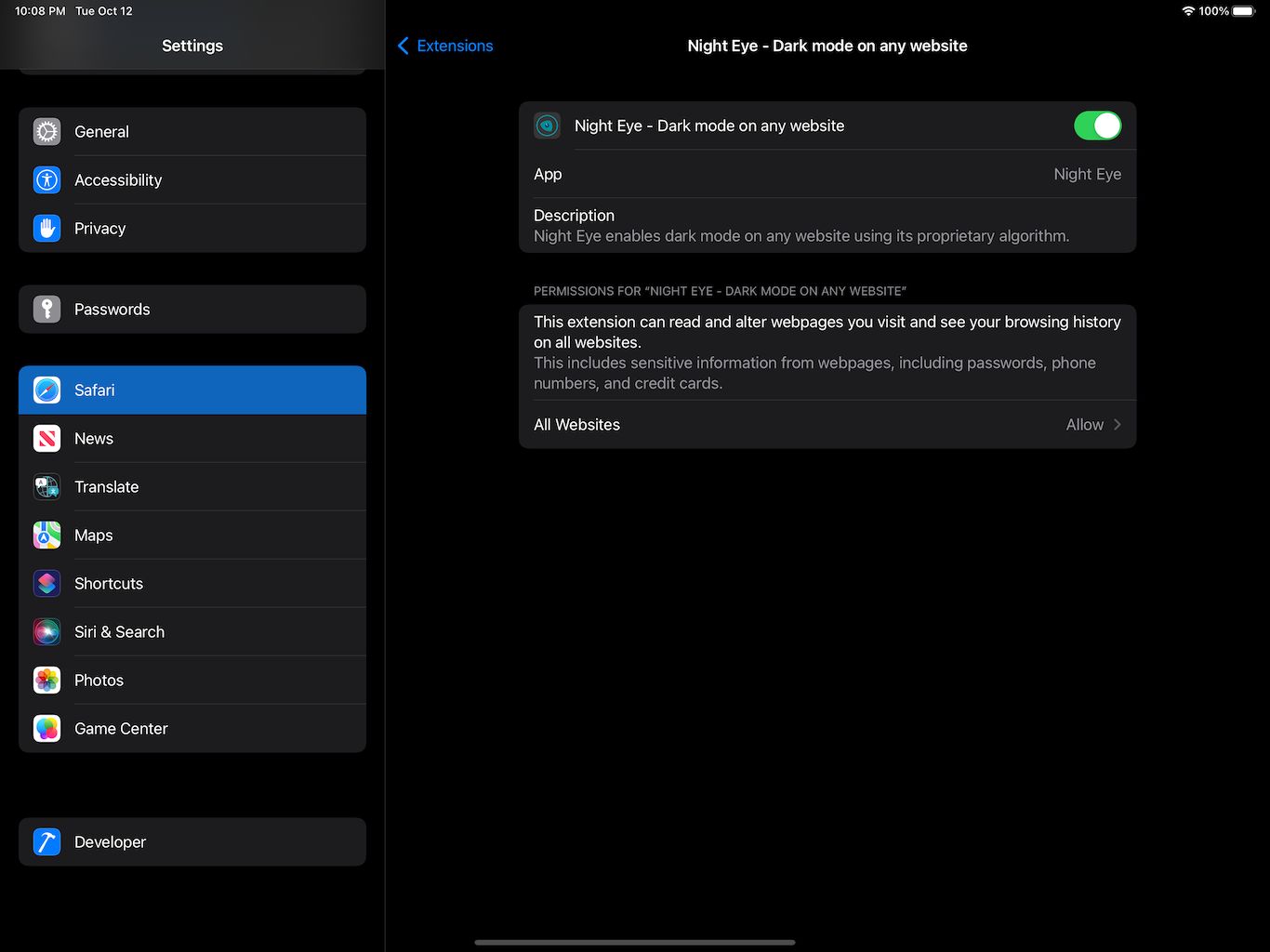Introduction
Welcome to the dark underbelly of the internet, where anonymity reigns supreme and secrets lurk in the shadows. The Dark Web, a hidden network that exists beneath the surface of the World Wide Web, has garnered considerable attention in recent years. It is a mysterious realm known for its illicit activities, encrypted content, and hidden marketplaces.
Curiosity about the Dark Web has piqued the interest of internet users worldwide, with many individuals eager to explore its depths. While accessing the Dark Web on a computer is fairly well-documented, how does one access it on a phone? In this article, we will unravel the process of accessing the hidden corners of the internet using a smartphone.
Before diving headfirst into the Dark Web, it is crucial to understand the legal implications and safety precautions associated with accessing this realm. While the Dark Web itself is not illegal, it is notorious for hosting various illegal activities and content, including drugs, weapons, hacking tools, and stolen information. Therefore, it is vital to approach the Dark Web with caution and adhere to all applicable laws.
In this guide, we will discuss the necessary safety measures to protect your identity and ensure your online security while accessing the Dark Web on your phone. We will explore the steps involved in setting up a secure browser, the use of virtual private networks (VPNs) for additional anonymity, and installing a virtual machine on your phone to create an isolated environment for browsing.
While the Dark Web may possess an air of mystery and intrigue, it is essential to approach it with a level-headed mindset. The Dark Web can be a dangerous place, with malicious actors and cybercriminals looking to exploit unknowing visitors. By following the guidelines in this guide, you will be better equipped to navigate the Dark Web safely and mitigate potential risks.
What is the Dark Web?
The Dark Web, also known as the Deep Web or Darknet, is a hidden part of the internet that cannot be accessed through regular search engines like Google or Bing. Unlike the surface web, which is the part of the internet accessible to the general public, the Dark Web exists on encrypted networks that require specific software or configurations to access.
The Dark Web is often associated with illegal activities, but it is important to note that not everything on the Dark Web is illegal. While it does host a significant amount of illicit content, such as illegal drugs, stolen data, counterfeit documents, and hacking tools, it is also a haven for whistleblowers, activists, journalists, and individuals seeking anonymity and privacy in their online interactions.
One of the key differences between the Dark Web and the surface web is the level of anonymity it provides. Users on the Dark Web can access websites without revealing their true identities, thanks to the use of Tor (The Onion Router) and other similar privacy-focused technologies. Tor routes users’ internet traffic through a vast number of encrypted relays, making it incredibly difficult to trace their online activities back to their original IP addresses.
To access the Dark Web, users typically rely on special browsers like Tor Browser, which is specifically designed to navigate the encrypted networks. These browsers ensure that users’ connections are anonymized, preventing surveillance and tracking by both governments and malicious entities.
Within the Dark Web, you will find various hidden marketplaces, forums, social media platforms, and other websites hosted on different anonymous networks. These sites may have unique domain extensions such as .onion, .i2p, or .bit and are often inaccessible without specialized tools or knowledge.
It is important to acknowledge that the Dark Web is not a lawless wasteland. Law enforcement agencies actively monitor and investigate illegal activities taking place on the Dark Web. Additionally, there have been instances of scams, malware distribution, and other cyber threats targeting unsuspecting users. Thus, caution and vigilance are necessary while exploring this hidden part of the internet.
Is it Legal to Access the Dark Web?
The legality of accessing the Dark Web varies from country to country. Generally speaking, accessing the Dark Web itself is not illegal in most jurisdictions. However, it is important to note that engaging in illegal activities while browsing the Dark Web is a criminal offense and can lead to severe legal consequences.
While the Dark Web is often associated with illegal activities, it also serves as a platform for individuals seeking privacy, anonymity, and uncensored communication. Whistleblowers, journalists, and activists use the Dark Web to share sensitive information, expose corruption, and protect their identities when operating in oppressive regimes.
It is essential to understand that accessing the Dark Web involves certain risks. Many websites found on the Dark Web engage in illegal activities, such as the buying and selling of drugs, weapons, stolen data, and hacking tools. Engaging in these activities can lead to criminal prosecution, regardless of the platform used.
In some countries, the mere act of accessing the Dark Web, even without engaging in illegal activities, may be monitored or raise suspicions. It is crucial to familiarize yourself with the laws and regulations pertaining to the Dark Web in your country or jurisdiction. Being aware of the legal landscape will help you make informed decisions about whether or not to access the Dark Web.
Law enforcement agencies around the world actively monitor illegal activities on the Dark Web. They employ advanced technology and specialized units to track down individuals involved in criminal operations, including drug trafficking, money laundering, and hacking. So, even if the Dark Web provides a certain level of anonymity, it is important to be aware that law enforcement agencies are constantly working to identify and apprehend criminals operating in this hidden realm.
To stay on the right side of the law, it is crucial to refrain from engaging in any illegal activities while accessing the Dark Web. It is also prudent to exercise caution when exploring the Dark Web, as malicious entities may attempt to scam or compromise unsuspecting users.
Ultimately, navigating the Dark Web safely and legally requires responsible and informed use. Understanding the legal implications and being mindful of the potential risks will help ensure a safe and lawful Dark Web experience.
Safety Precautions
When venturing into the Dark Web, it is crucial to prioritize your safety and protect your online identity. The anonymity and encrypted nature of the Dark Web can attract cybercriminals and malicious actors. By taking the following safety precautions, you can mitigate potential risks and safeguard your digital presence:
1. Keep your device and software up to date: Regularly update your smartphone’s operating system, browsers, and security software to ensure you have the latest security patches and protection against known vulnerabilities.
2. Use a trusted antivirus and anti-malware software: Install a reputable antivirus and anti-malware software on your phone to detect and prevent any malicious software that may compromise your data or privacy.
3. Enable two-factor authentication: Set up two-factor authentication whenever possible. This adds an extra layer of security by requiring a second verification step, such as a unique code sent to your phone or email, when logging into your accounts.
4. Create strong, unique passwords: Use complex passwords that include a combination of upper and lowercase letters, numbers, and special characters. Avoid reusing passwords across different accounts.
5. Use a virtual private network (VPN): A VPN encrypts your internet traffic, making it difficult for hackers or surveillance entities to intercept your communications. Choose a reputable VPN service that does not keep logs of your activity.
6. Be cautious of phishing attempts: Be wary of suspicious links or email attachments, especially those that request personal information. Phishing attempts can trick you into revealing sensitive data or installing malware on your device.
7. Limit the information you share: Be cautious about the personal information you share while accessing the Dark Web. Avoid revealing real names, addresses, or any other identifying details that could compromise your privacy or security.
8. Use separate identities: Consider creating separate personas or usernames to maintain anonymity while accessing the Dark Web. Avoid using the same username or email address associated with your identifiable online presence.
9. Keep backups of your data: Regularly back up important files and data on your phone or external storage devices. In case of any unfortunate incidents or malware attacks, having backups will help you restore your data.
10. Trust your instincts: If something feels off or seems too good to be true, trust your instincts and steer clear. The Dark Web can be a dangerous place, and it’s better to be cautious than to compromise your safety.
By implementing these safety precautions, you can minimize the risks associated with accessing the Dark Web and protect yourself from potential threats. Remember, your safety and privacy should always be a top priority when navigating the hidden corners of the internet.
Choosing a Secure Browser
When accessing the Dark Web on your phone, it is essential to choose a secure browser that prioritizes your privacy and provides a safe browsing experience. Here are some factors to consider when selecting a secure browser for accessing the Dark Web:
1. Tor Browser: Tor Browser is the most popular choice for accessing the Dark Web. It is an open-source browser that is specifically designed to navigate the Tor network. Tor Browser ensures that your connections are encrypted and anonymized, protecting your privacy and masking your online identity.
2. Brave Browser: Brave Browser is known for its strong privacy features. It blocks ads and trackers by default, enhancing your online security. Brave also supports Tor private tabs, allowing you to access the Dark Web with added privacy.
3. Firefox Focus: Firefox Focus is a privacy-focused browser that automatically blocks known trackers, cookies, and advertisements. It does not save your browsing history and has a simplified interface, making it a lightweight and secure option for accessing the Dark Web.
4. Onion Browser: Onion Browser is an iOS-exclusive browser that is specifically designed to access the Tor network on Apple devices. It provides a secure browsing experience by routing your internet traffic through the Tor network, ensuring your anonymity and privacy.
5. Orbot and Orfox: Orbot is an Android app that allows you to connect to the Tor network, while Orfox is the browser that is compatible with Orbot. Together, they provide a secure and private browsing experience on Android devices.
6. Opera Browser: Opera Browser offers a built-in VPN feature that encrypts your internet traffic and hides your IP address. While it is not specifically designed for accessing the Dark Web, the added privacy and security features make it a viable option.
7. Dolphin Zero: Dolphin Zero is a privacy-focused browser that automatically deletes your browsing history, cookies, and data as soon as you exit the app. It also blocks tracking scripts and offers incognito browsing, making it a suitable option for accessing the Dark Web.
Before selecting a browser, ensure that it is regularly updated and reputable. Evaluating user reviews, considering the browser’s privacy policy and security measures, and analyzing its track record in protecting user data are essential steps in choosing a secure browser.
Remember, no browser can provide 100% anonymity or protection. It is crucial to combine secure browsing practices with other safety measures, such as using a VPN and practicing cautious online behavior.
By selecting a secure browser that prioritizes privacy and security, you can enhance your online safety and protect your identity while accessing the Dark Web on your phone.
Using a VPN for Anonymity
When accessing the Dark Web on your phone, using a virtual private network (VPN) is highly recommended to enhance your anonymity and protect your online activities from prying eyes. A VPN creates a secure and encrypted connection between your device and the internet by routing your traffic through servers located in different locations worldwide. Here’s why using a VPN is crucial for anonymity:
1. Masking your IP address: A VPN hides your IP address, replacing it with the IP address of the server you connect to. This prevents websites and potential eavesdroppers from tracking your real location and identifying your device.
2. Encrypting your internet traffic: A VPN encrypts your internet traffic, ensuring that your data is secure and protected from interception by hackers or government surveillance. This prevents unauthorized users from monitoring your online activities.
3. Bypassing internet censorship: In some countries, access to the internet and certain websites may be restricted or censored. By using a VPN, you can bypass these restrictions and access the Dark Web and other blocked content.
4. Anonymity on public Wi-Fi networks: VPNs are crucial when connecting to public Wi-Fi networks, such as those found in cafes, airports, or hotels. These networks are often unsecured and vulnerable to data interception. A VPN encrypts your traffic, protecting your personal information and online activities from potential hackers on the same network.
5. Choosing a reputable VPN provider: It is crucial to select a reputable VPN service that follows strict privacy and no-logs policies. Avoid free VPNs that may sell your data or compromise your security. Look for VPN providers with a proven track record of protecting user privacy.
6. Multi-platform compatibility: Ensure that the VPN service you choose is compatible with your phone’s operating system. Whether you use Android or iOS, there are VPN apps available for both platforms.
7. Server locations: Consider the server locations offered by the VPN provider. Having servers in different countries allows you to choose an IP address from various locations, enhancing your anonymity. It also allows you to bypass location-based restrictions imposed by websites or services.
8. Connection speeds: Look for VPN providers that offer fast and stable connection speeds. Slow speeds can hinder your browsing experience, especially when accessing the Dark Web, which may require additional bandwidth due to its encrypted nature.
Remember that using a VPN is not a guaranteed shield against all threats. It is essential to combine VPN usage with other security measures, such as using a secure browser and practicing safe browsing habits.
By using a reputable VPN service on your phone, you can add an extra layer of security and privacy while accessing the Dark Web. Be sure to do thorough research and choose a VPN provider that aligns with your privacy needs and requirements.
Installing a Virtual Machine on Your Phone
Installing a virtual machine (VM) on your phone is an effective way to create an isolated and secure environment for accessing the Dark Web. A VM allows you to run a different operating system within your existing phone’s operating system, providing an extra layer of protection against malware and potential threats. Here’s what you need to know about installing a virtual machine on your phone:
1. Check your phone’s compatibility: Not all phones support virtualization, so it is important to ensure that your device is compatible. Check the specifications or consult the manufacturer’s website to verify if your phone supports running a virtual machine.
2. Choose a virtual machine app: There are various virtual machine apps available for both Android and iOS devices. Examples include VMOS, VirtualBox, and VMWare. Research and select a virtual machine app that is reliable and suits your needs.
3. Download and install the virtual machine app: Visit the official app store for your device, search for the virtual machine app you have chosen, and download and install it on your phone. Follow the instructions provided by the app to properly set it up.
4. Create a new virtual machine: Once the virtual machine app is installed, you will need to create a new virtual machine. This involves selecting the operating system you want to run within the virtual machine. Some virtual machine apps provide pre-configured images of different operating systems, while others may require you to provide your own installation files.
5. Configure the virtual machine: After creating the virtual machine, you may need to adjust its settings, such as the amount of RAM and storage allocated to it. Keep in mind that allocating too many resources to the virtual machine may impact the performance of your phone.
6. Install a secure browser and necessary software: Inside the virtual machine, install a secure browser like Tor Browser, along with any other necessary software for accessing the Dark Web. This ensures that your Dark Web activities remain isolated within the virtual machine and do not have any impact on your device’s main operating system.
7. Follow best practices for virtual machine security: Like any other software, virtual machines are not immune to vulnerabilities. Regularly update the virtual machine app and the operating system running within it to ensure you have the latest security patches. Additionally, exercise caution when downloading files or visiting websites within the virtual machine to minimize the risk of malware or other security threats.
Installing a virtual machine on your phone can provide an added layer of security and isolation when accessing the Dark Web. However, it is essential to remember that virtual machines are not foolproof and should be used in conjunction with other safety measures, such as using a VPN and practicing safe browsing habits. By taking these precautions, you can create a secure environment for exploring the Dark Web while minimizing potential risks to your phone and personal data.
Accessing the Dark Web Through Tor Browser
Tor Browser is the most popular and widely used tool for accessing the Dark Web. It is built on the Tor network, which provides anonymity and privacy by routing your internet traffic through a series of encrypted relays. Here’s how you can access the Dark Web using Tor Browser on your phone:
1. Install Tor Browser: Search for “Tor Browser” in your phone’s app store and download and install the official Tor Browser app. It is available for both Android and iOS devices.
2. Launch the Tor Browser: Once installed, open the Tor Browser app on your phone. The app will initiate the connection process to the Tor network.
3. Connect to the Tor network: Wait for the Tor Browser to establish a secure connection with the Tor network. This may take a few moments as the app connects through several relays to ensure your anonymity.
4. Start browsing the Dark Web: Once connected to the Tor network, you can start browsing the Dark Web. The Tor Browser has a modified version of the Firefox browser and provides access to .onion websites, which are exclusive to the Dark Web.
5. Be cautious of your browsing habits: While using Tor Browser, exercise caution and adhere to safe browsing practices. Be aware that even though the Tor network provides anonymity, it cannot guarantee complete security. Avoid downloading files or clicking on suspicious links to minimize the risk of malware or other security threats.
6. Respect privacy and legality: Remember that while exploring the Dark Web, it is essential to respect the privacy of other users. Do not engage in illegal activities or attempt to carry out malicious actions. Adhering to ethical guidelines while using Tor Browser contributes to the overall safety of the Dark Web community.
7. Regularly update Tor Browser: Keep your Tor Browser app up to date by installing the latest updates when they become available. This ensures that you have the latest security patches and improvements.
8. Consider additional security measures: To enhance your security and anonymity while using Tor Browser, consider using a virtual private network (VPN). Using a VPN in conjunction with Tor can add an extra layer of security and protect your privacy.
By following these steps and taking the necessary precautions, you can confidently access the Dark Web through Tor Browser on your phone. Remember to prioritize your safety, respect others’ privacy, and use Tor responsibly.
Navigating and Exploring the Dark Web
Once you have successfully accessed the Dark Web using Tor Browser on your phone, you are ready to navigate and explore its hidden depths. Here are some tips to help you make the most of your Dark Web experience:
1. Understand the .onion addressing: .onion is the top-level domain used for websites on the Dark Web. These websites cannot be accessed through regular browsers. To navigate to a specific .onion website, you will need to obtain the full web address and enter it directly into Tor Browser’s address bar.
2. Utilize Dark Web directories and search engines: Dark Web directories and search engines provide curated lists and search functions for finding specific websites or content on the Dark Web. They can help you discover interesting forums, marketplaces, and resources. However, keep in mind that not all search engines on the Dark Web guarantee complete anonymity.
3. Exercise caution and skepticism: The Dark Web is known for hosting illegal activities, scams, and malicious content. Approach websites and services on the Dark Web with caution and skepticism. Be wary of offers that seem too good to be true and avoid sharing personal or financial information.
4. Follow community guidelines: Many websites on the Dark Web have their own sets of rules and guidelines. Familiarize yourself with these guidelines before engaging in any discussions or transactions. Respect the community norms, be mindful of your interactions, and maintain a sense of privacy and anonymity.
5. Secure your communications: Encryption is crucial while communicating on the Dark Web. Use end-to-end encrypted messaging platforms or utilize PGP (Pretty Good Privacy) encryption for secure communication. Encrypting your messages ensures that only the intended recipient can access and read them.
6. Be aware of scams and fake websites: Scammers and fraudulent websites exist on the Dark Web, just as they do on the surface web. Be cautious when engaging in any financial transactions or providing personal information. Verify the reputation and authenticity of websites or marketplaces before making any purchases.
7. Stay updated with security news and forums: Keep yourself informed about the latest security news and updates within the Dark Web community. Participate in forums and discussions to gain insights, exchange information, and learn from others’ experiences. This knowledge can help you make informed decisions and stay safe while exploring the Dark Web.
8. Use discretion when interacting with others: As with any online community, exercise caution when interacting with other users on the Dark Web. Avoid revealing personal details or engaging in risky conversations. Remember that you can never be entirely sure of someone’s true intentions or identity online.
9. Report illegal activities: If you come across any websites or activities on the Dark Web that involve illegal content or activities, consider reporting them to the appropriate authorities. Helping to keep the Dark Web community safe and free from malicious activities benefits everyone.
Navigating and exploring the Dark Web can be an intriguing experience. However, it is essential to prioritize your safety, respect the community guidelines, and uphold ethical standards while immersing yourself in this hidden realm. With the right mindset and precautions, you can navigate the Dark Web safely and uncover its hidden trove of resources and knowledge.
Common Misconceptions and Dangers to Avoid
As the Dark Web is often shrouded in mystery and misinformation, it is important to debunk common misconceptions and be aware of the potential dangers that may arise. By understanding these misconceptions and dangers, you can navigate the Dark Web more safely and avoid unnecessary risks. Here are some key points to keep in mind:
1. Not everything on the Dark Web is illegal: While the Dark Web has gained a reputation for illegal activities, it is important to remember that not all content and transactions on the Dark Web are illicit. It also houses legitimate resources, including forums for privacy enthusiasts, whistleblower channels, and research papers on sensitive topics.
2. The Dark Web is not inherently dangerous: While there are risks associated with accessing the Dark Web, such as encountering scams or malware, it is possible to browse the Dark Web safely by taking necessary precautions. These include using secure browsers like Tor and VPNs, practicing cautious online behavior, and staying vigilant.
3. Anonymity on the Dark Web does not guarantee invincibility: While the Tor network provides anonymity, it is not foolproof. Law enforcement agencies and advanced computer forensic techniques can potentially de-anonymize users engaging in illegal activities. Therefore, it is crucial to avoid engaging in any illegal activities on the Dark Web.
4. Avoid downloading files from untrusted sources: Downloading files from untrusted sources on the Dark Web is a significant security risk. Malware, viruses, and other malicious software can be embedded within files. Always exercise extreme caution and avoid downloading files unless you can verify the trustworthiness of the source.
5. Beware of phishing scams: Phishing attempts can occur on the Dark Web just as they do on the surface web. Be cautious of websites or links that ask for personal information, financial details, or login credentials. Always double-check the authenticity of websites and avoid clicking on suspicious links.
6. Stay away from illegal activities: Engaging in illegal activities on the Dark Web can have severe legal consequences. Buying or selling drugs, weapons, stolen data, or engaging in hacking activities are all illegal and can result in criminal prosecution. Instead, focus on utilizing the Dark Web for legal purposes and responsible exploration.
7. Be cautious of marketplaces: Dark Web marketplaces can be hotspots for illegal activities and scams. Exercise caution when engaging in any transactions or purchases. Research the reputation of a marketplace, read user reviews, and use escrow services when available to minimize the risk of being scammed.
8. Avoid revealing personal information: Protect your privacy by refraining from sharing personal information on the Dark Web. Never reveal your real name, address, phone number, or any other identifiable details. The less information you provide, the safer you will be.
9. Don’t believe everything you see: The Dark Web is filled with disinformation, propaganda, and rumors. Exercise critical thinking and verify information from multiple sources before accepting it as truth. Don’t fall for scams or false claims that may try to lure you into engaging in illegal activities.
10. Use the Dark Web responsibly: The Dark Web can be a powerful tool for privacy, anonymous communication, and accessing uncensored information. However, it is crucial to use it responsibly and ethically. Respect the rights and privacy of others, follow community guidelines, and report any illegal activities you come across.
By being aware of these misconceptions and potential dangers, you can navigate the Dark Web more effectively and minimize the risks associated with accessing this hidden realm. With caution, responsible behavior, and an understanding of the implications, you can explore the Dark Web safely and responsibly.
Conclusion
Exploring the Dark Web on your phone can be an intriguing and eye-opening experience, but it is crucial to approach it with caution, respect the law, and prioritize your safety. The Dark Web, with its hidden networks and anonymous browsing options, offers a unique platform for privacy enthusiasts, activists, and individuals seeking uncensored information. However, it is also home to illicit activities and potential dangers that can pose risks to unsuspecting users.
By employing the safety precautions outlined in this guide, such as choosing a secure browser, using a VPN, installing a virtual machine, and practicing responsible browsing habits, you can enhance your online security and protect your anonymity while accessing the Dark Web.
Always prioritize your safety and be mindful of the legal implications associated with accessing the Dark Web. Understand that not everything on the Dark Web is illegal, but it is important to approach it with caution and avoid engaging in any illegal activities.
Remember that technology, including Tor Browser and VPNs, provides tools for privacy and security, but they are not foolproof. It is crucial to stay vigilant, remain informed about potential risks and emerging threats, and adapt your browsing habits accordingly.
A responsible and informed approach is key to exploring the Dark Web securely. By adhering to ethical guidelines, being cautious of scams and malware, and respecting the privacy of others, you can navigate the Dark Web safely and responsibly.
As technology evolves, so will the landscape of the Dark Web. Stay informed, keep software and security measures up to date, and continue to adapt your practices to ensure a safe and rewarding experience while exploring the hidden corners of the internet’s underbelly.

























